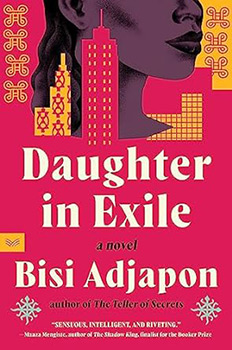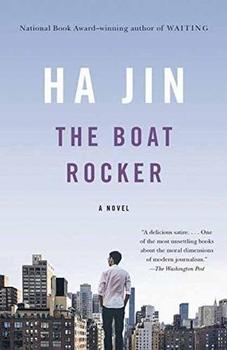Summary | Excerpt | Reading Guide | Reviews | Beyond the book | Read-Alikes | Genres & Themes | Author Bio

Any reviewer would be justified in calling Ha Jin's latest 672 page
novel plodding, the prose laborious, the observations and reflections banal, the
dialogue awkward and wooden. So why didn't I stop reading it? Perhaps because
Jin is a sly writer, whether he means to be or not. His bare, stilted prose
sneaks up on the reader, hiding its emotional and intellectual impact in formal
robes, until after 400 pages, one single turning point reveals the sum of their
hidden parts. Nan and Pingping Wu have brought their young son to America,
worked hard at menial jobs, opened a restaurant, bought and paid off a house in
only a handful of rather unremarkable years. Their business is thriving, they
have money in the bank, and their son is still in grammar school. Their marriage
is weary, but it began that way. As a reader, I'm more than a little perplexed
by how little has happened up to this point, how meticulously detailed that
"nothing" is, and more than a little suspicious I'm missing something. After
all, Ha Jin is a Pulitzer Prize winner – something's got to give, right?
Lulled and soothed by the day-to-day ins-and-outs of Nan and Pingping's life,
I'm feebly happy for them when their business thrives, vaguely regretful when
their marriage falters, mildly reassured when it slides back on track. Turning
the pages is a form of meditation, the five pages describing, say, Nan's
frustration with the bird feeder is somehow readable, but confusing for that
very reason. All in all, I'm numb – contentedly so, but numb nevertheless, and
wondering if it's worth reading on. Then, all of a sudden, on page 418, I
realize that's exactly how I'm supposed to feel. Stunned after receiving the
title to his house, Nan Wu realizes that in just a few years he's accomplished
what typically takes most immigrants a lifetime. The goal that was supposed to
sustain him into old age -- the struggle that should have staved off Nan's own
dreams for a larger intellectual and creative life, sacrificing so his child
might entertain real dreams and ambitions – has been met too early. Finding
ownership and monetary success far more acceptable and easily obtained than his
more nebulous ambitions, Nan becomes placated by the rhythm of the minor
successes and setbacks, a monotone of "success" in process, gradually distanced
from his desire to be a poet, and from the memory of his first, passionate love.
The jolt of dissatisfaction rekindles Nan's deeper ambitions, and at this point
I hope it might do the same for the novel. Unfortunately, it doesn't. Nan
remains wishy-washy and lost, and the novel peters out evenly, ending in the
same flatline as it began.
What worked marvelously in Jin's earlier novel, Waiting, doesn't work as
well in A Free Life, twice as long and half as exotic. Waiting's
achingly slow-moving plot serves to mirror the main character's dutiful 18-year
wait in communist China for his forbidden true love, and in just over 300 pages,
that device works. The prose is similarly deliberate and seemingly mundane, but
the otherwise banal details are made more seductive by the fact of their foreign
locale.
Clearly, readers will fall into separate camps over A Free Life.
Something about Jin's detached, yet obsessively attentive prose is ultimately
readable, and produces a style that some will read as refreshingly spare and
realist, while others find stunted and astoundingly boring. The bottom line: If
you've never read anything by Ha Jin, definitely read Waiting first. If
you're one of many who read Waiting and loved it, then try out A Free
Life. Already attuned to his stripped prose styling, you'll be interested to
see what happens when he removes the layer of exoticism and lays bare the
classic immigrant story with his meticulous rendering and trademark reserve.
![]() This review was originally published in The BookBrowse Review in November 2007, and has been updated for the
February 2009 edition.
Click here to go to this issue.
This review was originally published in The BookBrowse Review in November 2007, and has been updated for the
February 2009 edition.
Click here to go to this issue.

If you liked A Free Life, try these:

by Bisi Adjapon
Published 2024
The acclaimed author of The Teller of Secrets returns with a gut-wrenching, yet heartwarming, story about a young Ghanaian woman's struggle to make a life in the US, and the challenges she must overcome.

by Ha Jin
Published 2017
From the universally admired, award-winning author of Waiting and War Trash: an urgent, timely novel that follows an aspiring author, an outrageous book idea, and a lone journalist's dogged quest for truth in the Internet age.
In order to become the master, the politician poses as the servant
Click Here to find out who said this, as well as discovering other famous literary quotes!
Your guide toexceptional books
BookBrowse seeks out and recommends the best in contemporary fiction and nonfiction—books that not only engage and entertain but also deepen our understanding of ourselves and the world around us.